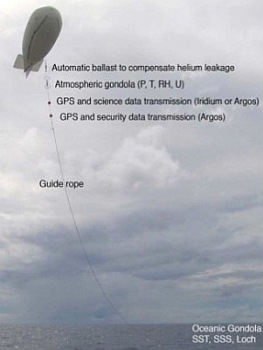Purpose of the flight and payload description
The Aeroclipper device is a balloon vertically stabilized by a guide rope aimed to perform flights of up to 30 days in the surface layer (under 50 m) over remote ocean regions. The system was a cooperative design between CNRS and CNES. The image at left shows the second generation of the balloon introduced in 2007 to replace the tetrahedral balloon used in the initial design. The adavantage of this new balloon (built by Raven Ind. from US) is that can be easily controlled during the deployment phase and because it is designed to remain stable under the effect of a relative wind on its structure and is more robust. Finally, its most important feature is to have an aerodynamic vertical lift, that is, that like an airplane wing, a horizontal relative wind causes a vertical force on the balloon. This aerodynamic lift prevents strong inclination of the system and allows lifting the guide chain (reduced hydrodynamic drag) in strong winds.
In the guide rope is attached an atmospheric gondola that contains instruments for measuring meteorological parameters (pressure, temperature, relative humidity, relative wind speed) and an oceanic gondola contains instruments for sea surface temperature, salinity and the speed with respect to water. A GPS position of the Aeroclipper is collected every minute and atmospheric measurements are performed every 10 seconds and averaged over 1 minute.
The data obtained along with the position is relayed to the ground control station using the Argos and Iridium communication platforms.
Details of the balloon flight
Balloon launched on: 1/13/2007 at 8:16 utc
Launch site: Seychelles International Airport, Mahe
Balloon launched by: Centre National d'Etudes Spatiales (CNES)
Balloon manufacturer/size/composition: Aeroclipper Aerostar TRFD
End of flight (L for landing time, W for last contact, otherwise termination time): 2/9/2007 at 13:16 utc
Balloon flight duration (F: time at float only, otherwise total flight time in d:days / h:hours or m:minutes - ): 27 d
Landing site: Last position: 63:38 º E - 25.13 º S
Campaign: VASCO 2007
This aeroclipper in particular along with Aeroclipper Nº 2 converged into Tropical Cyclone Dora during its developing stage and remained within the eye of the cyclone the following days. They stayed near the center of the eye for most of the active phase. Unfortunately, no atmospheric data were transmitted during this episode because both Aeroclippers onboard software had been accidentally switched to a wrong measurement mode a few days before.
External references
- L'Aéroclipper, J.P. Duvel Home page of Jean-Philippe Duvel at the Laboratoire de Météorologie Dynamique
- The Aeroclipper: A New Device to Explore Convective Systems and Cyclones Bull. Amer. Meteor. Soc., 90, 63-71
12897If you consider this website interesting or useful, you can help me to keep it up and running with a small donation to cover the operational costs. Just the equivalent of the price of a cup of coffee helps a lot.


